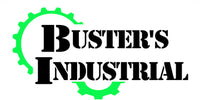
5 Common MRO Purchasing Mistakes and How to Avoid Them
Share
5 Common MRO Purchasing Mistakes and How to Avoid Them
Effective MRO (Maintenance, Repair, and Operations) procurement is crucial for minimizing costs, preventing downtime, and ensuring smooth operations. However, many businesses fall into common purchasing pitfalls that lead to unnecessary expenses and inefficiencies. Here are the top five MRO purchasing mistakes and how to avoid them.
1. Ignoring Supplier Performance and Relationships
Relying on unreliable suppliers can cause delays, poor-quality products, and hidden costs. Conducting regular supplier evaluations, establishing strong supplier relationships, and negotiating long-term contracts can enhance procurement reliability and cost savings. Many purchasers chose what they "have always done" due to ease of use. Working with a vendor like Buster's Industrial Supply, known for their dedication, can lead to time and cost savings.
2. Overlooking Total Cost of Ownership (TCO)
Many businesses focus solely on the upfront cost of MRO supplies without considering the Total Cost of Ownership (TCO). Factors like product quality, lifespan, maintenance frequency, and energy efficiency should be included in purchasing decisions to ensure cost-effectiveness in the long run. Cheap is not always "BEST". You can count on Buster's Industrial Supply to stand behind any product offered with the Industrial Performance Guarantee. If a product fails it qualifies to be replaced!
3. Poor Inventory Management
Excess inventory leads to increased storage costs and waste, while inadequate stock levels result in downtime. Implementing smart inventory management, such as automated reordering systems and real-time tracking, helps maintain optimal stock levels without overstocking or running out of critical supplies.
4. Lack of a Standardized Procurement Process
Without a structured procurement strategy, companies often experience inconsistent purchasing decisions, price fluctuations, and supplier mismanagement. Establishing a clear MRO procurement policy, centralizing purchasing, and using procurement software can enhance efficiency and cost control.
5. Failing to Leverage Bulk Purchasing and Cost-Saving Strategies
Many businesses miss opportunities to save by not negotiating bulk discounts, consolidating orders, or using group purchasing organizations (GPOs). Reviewing purchase history and identifying bulk-buying opportunities can lead to significant savings. Buster's Industrial Supply can always accommodate bulk purchasing at a discount, just ask!
Best Practices for Smart MRO Procurement
- Evaluate suppliers regularly and build strong partnerships.
- Focus on Total Cost of Ownership (TCO) instead of just upfront costs.
- Use inventory management tools to optimize stock levels.
- Implement a structured procurement strategy to streamline purchases.
- Take advantage of bulk purchasing and cost-saving opportunities.
Final Thoughts
Avoiding these common MRO purchasing mistakes can lead to significant cost reductions, improved efficiency, and less downtime. By implementing best practices in procurement, businesses can ensure they get the right products at the best value while maintaining operational excellence.
Contact your Buster's Industrial Supply rep for a free assessment.
